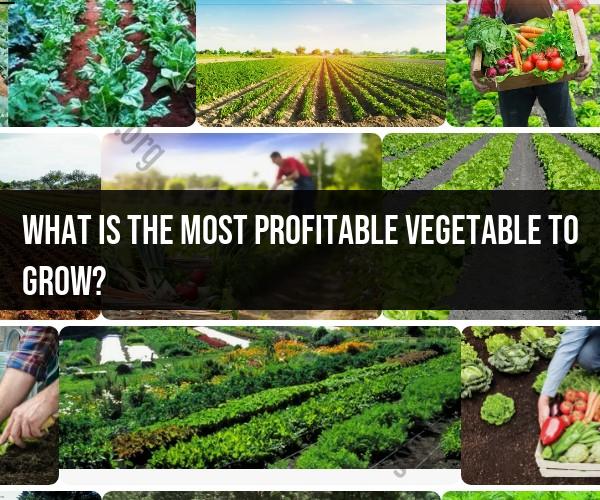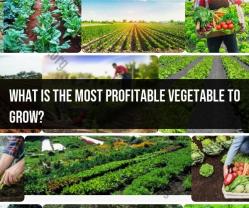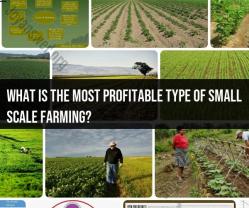What is the most profitable vegetable to grow?
The profitability of growing vegetables can vary depending on several factors, including your location, climate, soil quality, market demand, and your farming or gardening skills. What's profitable in one area may not be as profitable in another. However, here are some vegetables that are often considered profitable to grow in many regions:
Tomatoes: Tomatoes are a popular and versatile vegetable with high demand. They can be grown in various forms, including cherry tomatoes, heirlooms, and specialty varieties. Growing tomatoes efficiently and selling them at local markets or directly to consumers can yield a good profit.
Microgreens: Microgreens are young, edible greens harvested at an early stage of growth. They are known for their high value and can be sold to restaurants, farmers' markets, and specialty stores. Popular microgreens include arugula, basil, and radish.
Peppers: Bell peppers, hot peppers, and specialty varieties like shishito peppers can be profitable crops. They have a longer growing season in many regions and are in demand for fresh consumption and culinary purposes.
Herbs: Herbs like basil, cilantro, mint, and rosemary are high-value crops. They can be grown in small spaces and have a strong market demand, especially in the culinary industry.
Garlic: Garlic is a staple in many cuisines and has a relatively long shelf life. It can be grown in the fall and harvested in the spring, making it a profitable option for many growers.
Kale and Spinach: These leafy greens are not only healthy but also in demand. They are suitable for both direct sales and farmers' markets, and they can often be grown year-round in some regions.
Gourmet Mushrooms: Specialty mushrooms like shiitake, oyster, and maitake have a growing market, and they can be grown in small spaces or on logs. They often command a higher price per pound compared to common mushrooms.
Salad Greens: Various salad greens, such as lettuce, arugula, and mixed greens, are easy to grow and have consistent demand. They can be sold as individual varieties or as mixed salad greens.
Zucchini and Squash: These fast-growing vegetables are prolific producers. They can yield a high volume of produce, making them profitable for both direct sales and local markets.
Pumpkins: While pumpkins may have a limited market season (primarily during the fall for Halloween and Thanksgiving), they can be profitable due to their large size and decorative use.
Remember that profitability also depends on your ability to manage costs, market your products effectively, and adapt to local demand. Conducting market research and considering your unique circumstances is essential when choosing which vegetables to grow for profit. Additionally, consider factors like climate, soil, and pest control strategies to ensure successful cultivation.
Cultivating Profit: Discovering the Most Profitable Vegetables to Grow
Not all vegetables are created equal when it comes to profitability. Some vegetable crops are more profitable to grow than others, due to a variety of factors, including market demand, production costs, and storage requirements.
When choosing which vegetables to grow for profit, it is important to consider the following factors:
- Market demand: What vegetables are in high demand in your area? You can research this information by talking to local farmers market vendors, grocery store managers, and restaurant chefs.
- Production costs: How much does it cost to produce each vegetable crop? This includes the cost of seeds, transplants, fertilizer, pesticides, and labor.
- Storage requirements: How long can each vegetable crop be stored before it goes bad? This is important to consider, especially if you are growing vegetables for wholesale markets.
The Green Goldmine: Choosing the Most Profitable Vegetable Crops
Here is a list of some of the most profitable vegetables to grow:
- Leafy greens: Leafy greens such as lettuce, spinach, and kale are in high demand and can be grown relatively quickly. They are also relatively easy to store, making them a good choice for wholesale growers.
- Microgreens: Microgreens are young vegetable seedlings that are harvested just before they develop their first true leaves. They are becoming increasingly popular in restaurants and grocery stores, and they can be grown indoors year-round.
- Heirloom tomatoes: Heirloom tomatoes are prized for their unique flavors and textures. They can be sold at a premium price to farmers market shoppers and restaurant chefs.
- Specialty mushrooms: Specialty mushrooms such as shiitake, oyster, and portobello mushrooms are in high demand and can be grown indoors year-round.
- Gourmet herbs: Gourmet herbs such as basil, cilantro, and rosemary are in high demand and can be sold at a premium price to farmers market shoppers and restaurant chefs.
Maximizing Earnings: Profitable Vegetable Farming Practices
In addition to choosing the right vegetable crops to grow, there are a number of other things that farmers can do to maximize their profits:
- Grow high-quality vegetables: The higher the quality of your vegetables, the higher price you can charge for them. Focus on using sustainable farming practices to grow healthy, flavorful vegetables.
- Direct market your vegetables: Selling your vegetables directly to consumers at farmers markets or through a community supported agriculture (CSA) program can help you to earn more profit.
- Add value to your vegetables: You can add value to your vegetables by processing them into other products, such as jams, jellies, or sauces. You can also sell CSA shares that include recipes and cooking instructions.
By following these tips, farmers can cultivate profitable vegetable farming businesses.







